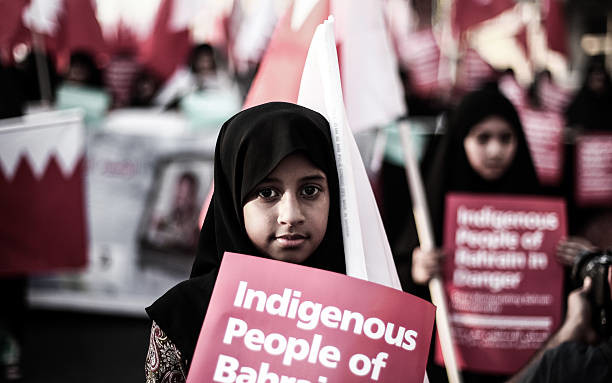9 August 2018 – Today, on the International Day of the World’s Indigenous People, Americans for Democracy & Human Rights in Bahrain (ADHRB) calls on Bahrain to end all forms of discrimination against its native populations, including the Baharna and Ajam indigenous groups.
According to the United Nations, indigenous people are arguably one of the most disadvantaged and vulnerable groups of people in the world. In Bahrain, there is an extensive history of discrimination against the kingdom’s indigenous groups, specifically the Baharna and Ajam. The Baharna, Bahrain’s indigenous ethnoreligious Shia community, are the longest continuous inhabitants of Bahrain. The Baharna account for as much as 70 percent of the Bahraini Shia population, by some estimates. They are accompanied by a smaller native Ajam population, a group of Persian descent who also predominantly ascribe to Shia Islam. The Baharna and Ajam populations face broad forms of prejudice due to their specific indigenous and ethnic heritages and the Bahraini government has continually undermined their historic and cultural ties to the country.
The Baharna and Ajam face discrimination in social welfare, employment, education, and culture. They regularly face institutionalized obstacles to acquire state-owned housing or to pursue public sector employment. The Baharna and Ajam populations find themselves frequently passed up for other non-Shia candidates, especially in the security sector where foreign Sunni nationals are offered expedited citizenship and other benefits to join the almost exclusively Sunni security forces. Additionally, the vast majority of Baharna and Ajam children are unable to receive a Shia religious education in school and there is an anti-Shia bias when distributing scholarships. Meanwhile, the authorities have also worked to systematically exclude indigenous culture from the country’s official history, media, and educational curricula. State-sponsored textbooks and museums typically downplay or outright reject the importance of Shia – and specifically Baharna – communities in the history of Bahrain, focusing instead on the Al Khalifa royal family and the period following their invasion of the country in the late eighteenth century.
In Bahrain, the government has also punitively revoked the citizenship of over 700 Bahrainis since 2012 – a majority of them Shia Muslims of Baharna or Ajam heritage. Institutional discrimination against Ajams has already created a large number of stateless people in the community, which has forced them disproportionately into lower socioeconomic conditions. Being both Shia and stateless, these individuals are even more likely to be denied access to social welfare or assistance programs available to other Bahraini citizens, or targeted for forced expulsion. By depriving Baharna and Ajam Bahrainis of their citizenship and engaging in broader demographic engineering policies, the government is violating its obligation to guarantee equal enjoyment of the right to nationality.
“As the international community comes together on this day to combat and end the systematic discrimination against indigenous people, we raise up the cases of Bahraini Baharna and Ajams. It is completely unacceptable for the Bahraini government to discriminate against groups of people that have such a rich and meaningful connection to the country’s history and culture,” says Husain Abdulla, ADHRB’s Executive Director. “The discrimination of these groups is in clear violation of international human rights standards and cannot be taken lightly. The Bahraini government should take this international day for indigenous peoples to implement concrete measures to eliminate all forms of discrimination and prejudice against the Baharna and Ajam populations.”
The Bahraini government’s blatant disregard for the human rights and well-being of Bahrain’s indigenous population is a testament to the kingdom’s lack of commitment to upholding international standards. On the International Day of the World’s Indigenous People, ADHRB calls on the Bahraini government and all countries to end systematic discrimination against indigenous people and to work to preserve their human rights, as well as their rich culture and history.





